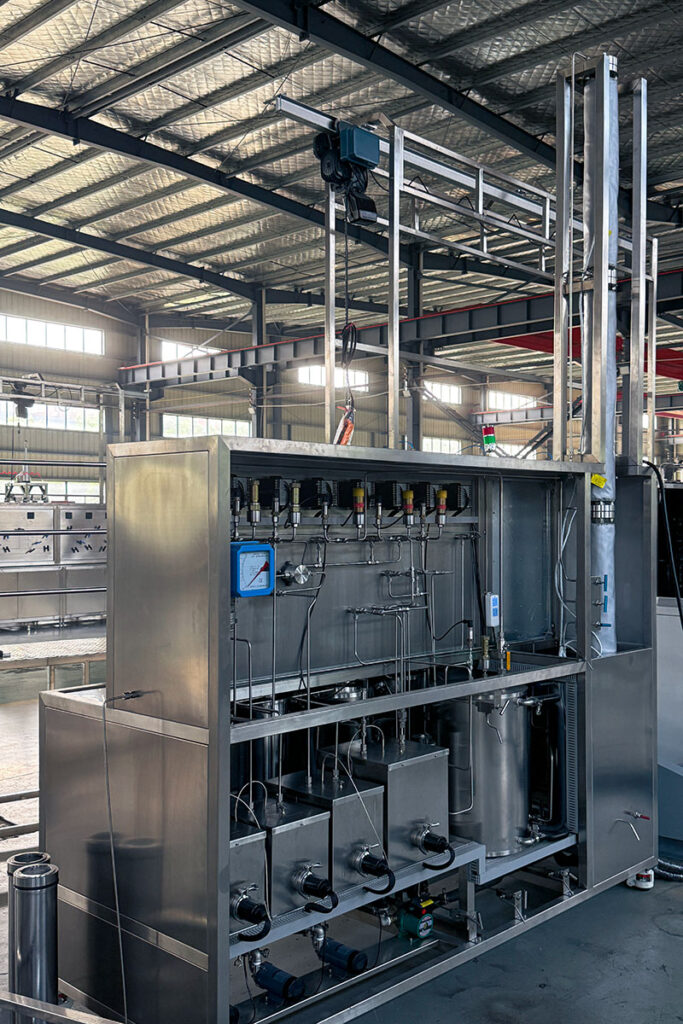Supercritical CO2 extraction (SC-CO2) is a clean, efficient, and solvent-free method. It is widely used in food, pharma, and essential oil industries. Optimizing process parameters—like temperature, pressure, CO2 flow, and entrainers—is key to improving yield and product quality. This guide explains each factor in detail for better lab and industrial outcomes.
Supercritical CO2 Extraction of Essential Oils from Common Aromatic Plants [Read More]

1. Raw Material Preparation: Start with the Right Step
Moisture Matters
Too much water increases polar compounds in the extract. Too little water may cause clogging and lower permeability.
Tip: Keep moisture content between 5% –10%.
Particle Size Affects Yield
Smaller particles improve contact but may block the system. Too fine powders form clumps under pressure.
Tip: The ideal size for plant materials is 0.3–1 mm.
Example: Ginger oil yield increased with grinding but dropped again when the particle size was too small.
2. Extraction Temperature and Pressure: Control Solvent Power
CO2 density depends on pressure and temperature. Higher density means stronger solvent power. But there’s a trade-off.
- Low pressure favors volatile oils.
- High pressure extracts heavy compounds but may lower selectivity.
Recommended Range:
- Flavors: 8–12 MPa, 35–45°C
- Oils: 20–35 MPa, 40–50°C
- Actives: >25 MPa, 30–45°C
Example: Garlic extract at 45°C showed degraded compounds, while 25–36°C preserved quality.
3. CO2 Flow and Extraction Time: Balance Speed and Contact
Flow Rate
- Too low: poor contact.
- Too high: CO2 exits too fast, wasting gas.
Tip:
- Lab scale: 0.5–2 L/min
- Pilot scale: 2–10 L/min
Extraction Time
At first, yield rises fast. After a few hours, it levels off. Extra time brings little benefit.
Tip: 2–4 hours is usually enough.
Example: Tea seed oil extraction reached max yield at 3 hours.
4. Entrainers: Boost Polar Compound Solubility
Some compounds are hard to extract with CO2 alone. Adding small amounts of ethanol or methanol can help.
- Ethanol: Common, safe, boosts solubility
- Water: Useful in protein-rich systems
- Acetone: For special polar targets
Example:
- 3% ethanol doubled lipid yield from egg yolk powder.
- 10% ethanol raised peanut oil yield by 230%.
Note: More entrainer means more separation steps later.
Supercritical CO2 Extraction Using Entrainers: Enhancing Solubility and Selectivity [Read More]
5. Separation Pressure & Temperature: Achieve Better Purity
After extraction, compounds must be separated from CO2. Adjust pressure and temperature to control this step.
- Lower pressure = better separation
- High temperature = easier release but more loss of volatiles
Tip: Use multi-stage separators for complex products.
Example:
Anise oil extraction used two separators:
- Stage 1: 12 MPa removed waxes and pigments
- Stage 2: 6 MPa collected aroma compounds
This gave cleaner, lighter oil.
6. Summary: Key Process Optimization Table
| Parameter | Recommended Setting |
|---|---|
| Pressure | 8–35 MPa |
| Temperature | 30–50°C |
| Flow Rate | 0.5–10 L/min |
| Particle Size | 0.3–1 mm |
| Extraction Time | 2–5 hours |
| Entrainers | Ethanol, Water (1%–10%) |
| Separation | Use 2 or 3 stages if needed |
Careful control of each variable improves product yield, saves CO2, and reduces cost. Whether for lab or production, process tuning is essential.
FAQ
Q1: What is the best pressure for CO2 extraction?
A: It depends. Use 8–12 MPa for volatile oils, over 25 MPa for active compounds.
Q2: Why add entrainers?
A: They improve the solubility of polar compounds like flavonoids and alkaloids.
Q3: How long should I extract?
A: 2–4 hours is usually enough. After that, the yield increase is minimal.
Q4: What’s the risk of high temperature?
A: It may cause thermal breakdown of sensitive compounds and loss of aroma.
Q5: Do I need multiple separators?
A: Yes, if your extract has both volatile and heavy components. Multi-stage improves purity.
Trusted by Global Clients
Our CO2 extraction systems have been sold to over 30 countries, including the USA, Germany, Thailand, and Australia. From start-up brands to well-known herbal extract manufacturers, our customers trust us for:
- Reliable equipment performance
- Excellent technical support
- One-stop turnkey solutions
- Remote installation guidance and training
Supercritical CO2 Extraction Market Report
Contact Us
Looking for the right supercritical CO2 extraction equipment for your business? Contact us today for custom quotes, technical consultation, and free extraction process evaluation.
Email: [email protected]
WhatsApp/Phone: +86-134-8515-5519
You can view other models of supercritical CO2 extraction equipment [View More]